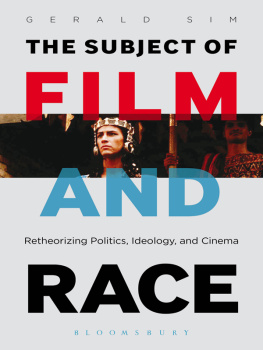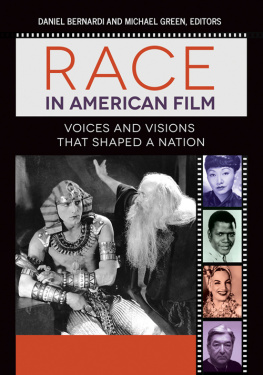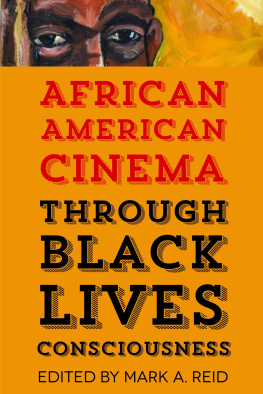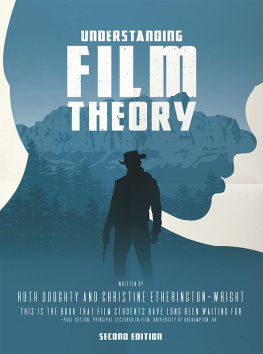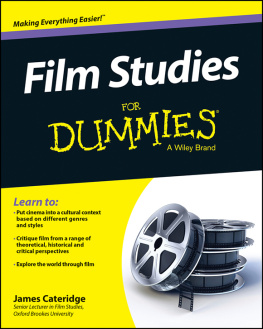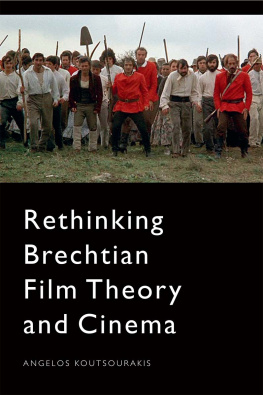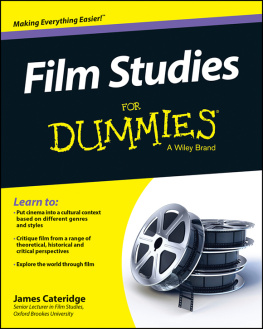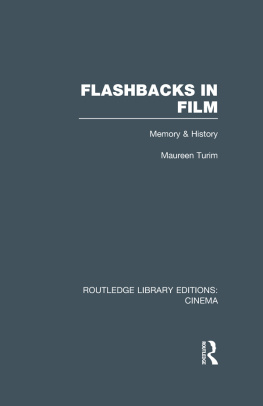The Subject of Film and Race
The Subject of Film and Race
Retheorizing Politics, Ideology, and Cinema
Gerald Sim

Contents
I share this book with those who contributed mightily or offered invaluable support. Mitsuhiro Yoshimoto and Louis-Georges Schwartz were dialectical and iconoclastic interlocutors: ones sheer economy set off the others gripping excess. Rick Altmans advice and example always kept production on schedule. David Depew is an insightful and catholic muse, and a great coffee companion who will discuss Hegel anytime and any place. Paula Amads input was honest, direct, and valuable. Always pick up her gauntlets. My conversations with Michael Meneghetti and Christopher Babey echo throughout these passages; this project was conceived from shared affinities and frustrations. Nicole Brenez was generous with the readings she offered of early chapters. Ed Buscombes affection for the Western and Bryan Gilliams energy for film music were highly influential. James Tweedie is one of the good guys in this racket; I am endlessly grateful for his counsel. Toward the end, Jon Lewis and Rosalind Galt helped to unravel what seemed like impenetrable mysteries. Deep thanks of course go to my editor Katie Gallof and her staff at Bloomsbury for their faith and investment in this project, and to the anonymous reviewers who strengthened it.
Part of was published as Saids Marxism: Orientalisms Relationship to Film Studies and Race, in Discourse: Journal for Theoretical Studies in Media and Culture, 34.23. It appears here with the kind permission of Wayne State University Press. I am grateful to its editors and blind reviewer for supporting the work, and reserve special thanks for Genevieve Yues editorial labors.
Eric Freedman and Chris Rob handed me my first job and that will always mean something to me. I have shared an office wall with Stephen Charbonneau for six years, and still cannot believe my luck: This stuff just flies through the air... You just gotta know how to grab it.
Thanks to all my students who kept faith with Adorno, namely Chris Vanderwall whose comment in Introduction to Critical Reading and Viewing smoothed out one of the final creases in Younger. My corner is overpopulated with friends and colleagues who offered support in many forms and at all hours. Thank you, Andy Brodie, Scott, Kristin, and Jack Christopherson, Emily Light, Carol Schrage, Jesse Sheedy, and Sophia and Dhelia, partners in crime.
Peter Sim once mused that tobacco taxes are effectively a levy on the poor because the rich dont have the kind of problems that smoking provides relief for. They dont need to smoke, but poor people do. My father smoked a pack-a-day from boyhood. The habit did his pulmonary health no favors, but to this day secondhand smoke smells like memories. His ruminations on tobacco policy represent my first and abiding lesson in class-consciousness. Looking back, I have to think that my worldview was shaped by the profundities that cut through those plumes. No one taught me more about alienated labor, use and exchange value, and species being more than he, not with those words but no less plainly. I will forever remember the lessons that his face imparted on the sublimities of Hitchcock, Tashlin, and Donen, on how to enjoy political rallies like stand-up comedy, how to treat every moment as parody, and the advice said and unsaid about how important it is to live happy.
Is it racist? We still often ask that question about popular culture, in which cinema continues to provide abundant kindling for racial controversy. As history evaluates whether Barack Obamas promise of a post-racial America has been fulfilled, a mere glance at the multiplex can disavow that notion. Although films such as The Blind Side, Precious (both 2009), The Help (2011), and Django Unchained (2012) were either critical or commercial successes, the film reviews and social commentaries they engendered evince that race remains a highly contested issue. Film culture is a prominent forum for that public debate. Its audiences appear to possess keen awareness of ideologys presence in films as well, within the stereotype but also beyond. In these four films, empathy and identification lie unmistakably with the victims and not the perpetrators of racial prejudice who are punished by narratives end. None of them can be accused of encouraging racial animus outright in the way that The Birth of a Nation (1915) clearly does. But the popular criticism proved sufficiently sophisticated to ponder other factors at play. They asked why black triumphs are inevitably facilitated by white saviors (Figure I.1). Is that racist? Are any ideological failings attributable to white directors? Are they racist? Are they morally or experientially authorized to tell these stories? Questions like these stand as a testament to the striking success of film theorists and critics who have taken on cinemas relationship to race. Their ideas are discernibly active in public discourse, and the influence of their enterprise on both film scholarship and popular criticism is clear.
That work within film studies can be understood within the wider political struggles for racial equality. In the aftermath of the tumultuous 1960s, film criticism began a battle of its own. However, even after the election of Americas first African American president, the political outcomes of that era remain mixed. The political importance of passing civil rights legislation is tempered by stark reminders for instance, of the failure to eradicate the minority underclass. Correspondingly significant levels of social change did not accompany the hard-won constitutional protections. But tumultuous political events eventually turned attention toward mass medias complicity with racial ideology. What I call critical race film theory and criticism gathered momentum in the early 1970s. Where sit-ins, boycotts, and marches to change racist social practices left off, the critical movement to alter public minds picked up. With this book, I propose to interrogate that film criticism that concerns itself with race. I examine the ground that the project has covered and the direction it has taken. I launch my proposition from the fields political context because in the end, political efficacy is essentially the final measure by which these endeavors will be judged. One assumes that this is how those projects would wish to be considered. Basically, critical race film studies analyze how cinema communicates racist values to individual spectators and society at large. Its exponents theorize textual operations to analyze cinematic racism. To wit, they apply critical theory to explain how the medium carries racist ideology. How have the fortunes of critical race film theory fared as a result of being tethered to those ideas? How politically effective then, are those ideas?
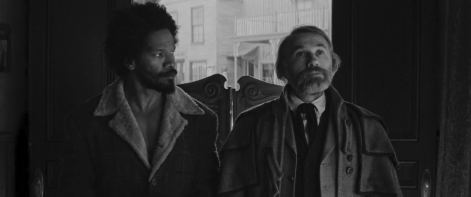
Figure I.1 Django (Jamie Foxx) and his white savior, King Schultz (Christoph Waltz). Is it racist? (Django Unchained, 2012).
The term, critical race film studies borrows its nomenclature from critical race theory. First developed in legal scholarship, critical race theory is a multidisciplinary corpus of theoretically oriented research that, according to its eminent exponents Richard Delgado and Jean Stefancic, is interested in studying and transforming the relationship among race, racism, and power. According to these tenets, critical race is thus an apt moniker for film scholars concerned with race-centered analysis, due to their shared interests in examining ideology, discourse, and identity. Over approximately four decades of Anglo-American scholarship investigating how concepts and questions centered on race and ethnicity are represented and articulated in the cinema, these themes from critical race theory have endured in its sister discipline from film studies.
Next page
